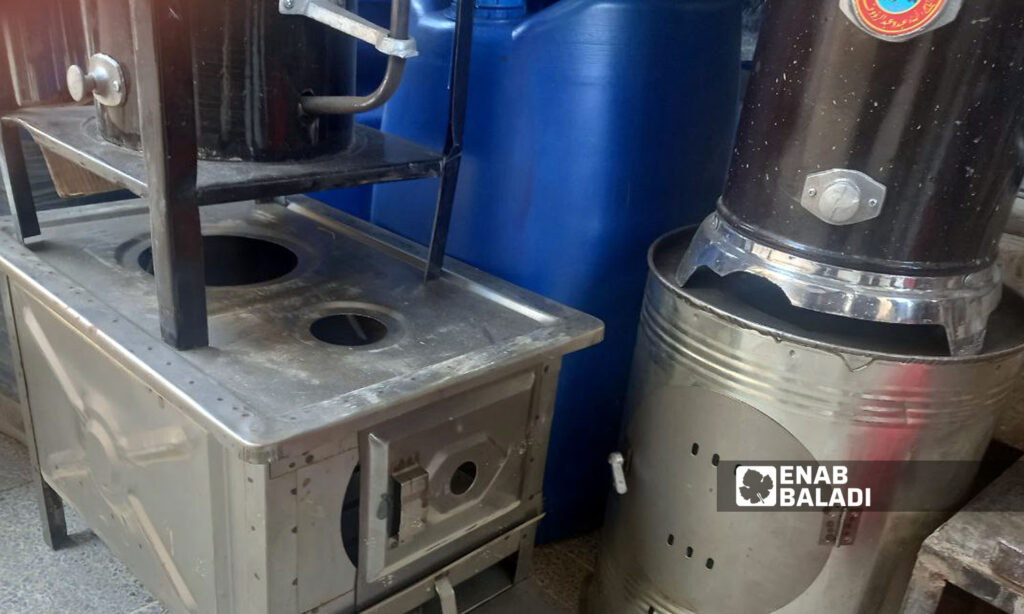The city of Qamishli is undergoing a severe fuel crisis due to limited allocations and the high cost of traditional heating methods, leading many residents to search for alternative heating solutions during the winter season.
Wood-burning heaters have become widespread in the city’s markets, with some residents opting for them as an effective and affordable means of heating, especially given the difficulties associated with using traditional heating methods that rely on diesel, electricity, or gas.
Wood-burning heaters have become a suitable alternative embraced by Syrians, as reported by Enab Baladi’s correspondent, who resort to using dead trees and dry branches in their fields as fuel.
Maysar al-Zayid (39 years old), a resident of Qamishli, told Enab Baladi that diesel is very expensive and using wood-burning heaters is currently the least costly option.
He added that the prices of heaters have skyrocketed this year, and his family has not yet received their diesel allocations.
Al-Zayid explained that he bought a heater worth 400,000 Syrian pounds last year, but it now needs maintenance due to its poor quality.
“Those who can afford to buy fuel should take care of maintaining their heaters at home,” said al-Zayid to Enab Baladi, pointing out that the price of a medium-sized heater has reached 600,000 Syrian pounds, and it needs to have the burner replaced annually.
Al-Zayid believes that this year’s winter will be harsh, and many residents will resort to purchasing wood-burning heaters, reflecting the challenges faced by people in obtaining heating methods amid difficult economic conditions.
Size and type determine the price
Suhail Abdou, the owner of a heater store in Qamishli, explained the differences between heaters.
He said that there are locally made heaters that are manufactured by blacksmiths in cities and rural areas of al-Hasakah province using sheet metal. These types are cheaper and range between 150,000 and 200,000 Syrian pounds.
The second type relies on materials imported from Aleppo governorate and is made of clay and cast iron. This type is considered superior in performance because it retains heat for a longer period and consumes less fuel. The price of this type is around 700,000 Syrian pounds, depending on the type of sheet metal used, such as thermal sheet metal, for example.
He also mentioned the availability of heaters imported from Turkey, with a price tag of around one million Syrian pounds, known for their quality and performance.
The US dollar is trading at 14,200 Syrian pounds, according to the S-P Today website, which specializes in foreign exchange rates.
In a visit to the city’s market, Enab Baladi’s correspondent confirmed that the current period is the peak season for maintenance shops, as they are witnessing a high demand for the repair of old heaters.
They explained that many people are requesting to convert their heaters to burn wood due to the unavailability of diesel, and if it is available on the black market, its price increases to more than 4,000 Syrian pounds per liter.
Khidr Abdi, the owner of a wood-cutting workshop in Amuda, who cuts and sells firewood in his town, mentioned in his interview with Enab Baladi that the price of firewood has increased this year compared to last year.
He explained that prices vary depending on the quality of the firewood, and the price per ton of “Western” firewood is 1.1 million Syrian pounds. The price of a ton of “Oak” firewood reaches 1.2 million Syrian pounds.
The price of a ton of “Berry” firewood is 1.3 million Syrian pounds, and this increase is related to the readiness of the firewood for use, such as the difference in its maturity between green, dry, and dead, according to Abdi.
He also mentioned the increased demand for purchasing firewood at carpentry shops in Amuda this year, as people use sticks and leftover wood pieces for heating, reflecting the growing interest in firewood as an effective heating method amid rising fuel prices.
Fuel distribution mechanism
In a previous interview with a responsible source in the Fuel Committee affiliated with the Autonomous Administration in Qamishli, it was explained to Enab Baladi that the distribution process is carried out according to specific procedures. A monitor from the Administration coordinates with the Committee and the communes to gather the necessary information about eligible families, and fuel distribution cards are activated in the presence of the relevant person. Coordination is carried out with the Statistics Office to add information such as the housing number and the number of family members to the fuel card.
According to the official, each family receives 300 liters of diesel for heating at a low price of 325 Syrian pounds per liter (0.25 USD), while the price of a liter of diesel in the same region reaches 5,000 Syrian pounds.
The Autonomous Administration previously raised the price of heating diesel allocated to residents through the “laser card” from 125 Syrian pounds to 325 pounds in August of last year.
This decision was an extension of a previous one, in which allocations were reduced from 450 liters to only 300 liters in 2022.
The Executive Council of Jazira region published a video recording on its official Facebook page, on October 25, during which the head of the Fuel Office spoke about the reasons for the delayed distribution of fuel allocations, which he attributed to Turkey’s bombing of oil installations in many areas of the northeastern region.
The Fuel Committee of the Syrian regime’s government in al-Hasakah city distributed fuel to residents in the neighborhoods under its control within the “security square” at a rate of 300 liters per household.
It stated that it distributed more than 233,000 liters of diesel, benefiting 840 families.

